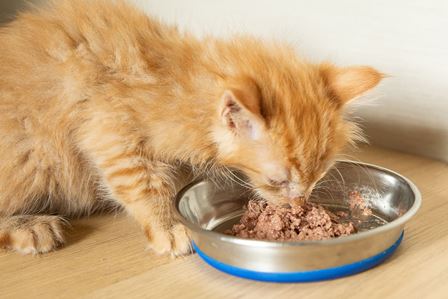1. Introduction to kitten nutrition
Importance of proper nutrition for 4-week-old kittens
Proper nutrition is crucial for the healthy growth and development of kittens, especially during their early stages of life. At 4 weeks old, kittens are transitioning from their mother’s milk to solid food, so it is essential to provide them with the right nutrients to support their development. A balanced diet not only ensures proper growth but also strengthens their immune system and promotes overall health.
Difference between wet and dry food for kittens
When it comes to choosing the right food for your 4-week-old kitten, you may have to decide between wet and dry food options. Each type has its benefits, and it’s important to understand the differences:
Wet food: Wet or canned food generally has a higher moisture content, which helps keep kittens adequately hydrated. It is easier for kittens to chew and swallow, making it a suitable option for younger kittens who are still developing their teeth. Wet food also tends to have a stronger aroma and taste, making it more appealing to picky eaters. Additionally, it provides variety in texture and flavors, which can help introduce different tastes to your kitten’s diet.
Dry food: Dry food, on the other hand, has a lower moisture content and is more concentrated in nutrients. It requires more chewing, which can help promote dental health by reducing plaque and tartar buildup. Dry food is convenient as it can be left out for kittens to nibble on throughout the day, and it has a longer shelf life compared to wet food. However, it is important to ensure that your kitten has access to fresh water at all times when consuming dry food.
Ultimately, the decision between wet and dry food will depend on your kitten’s specific needs and preferences. It may be beneficial to consult with your veterinarian to determine the best diet for your 4-week-old kitten.
2. General feeding guidelines for 4-week-old kittens
Recommended frequency of feeding
At 4 weeks old, kittens are just beginning to transition from their mother’s milk to solid food. It is important to provide them with proper nutrition to support their growth and development. Here are some general feeding guidelines for 4-week-old kittens:
1. Frequency: Kittens at this age should be fed approximately 4 times a day. This ensures they receive a steady supply of nutrients throughout the day.
2. Wet food: Wet food is a good choice for 4-week-old kittens as it is easier for them to chew and digest. It also provides them with the necessary hydration they need at this stage.
3. Consistency: When feeding wet food, you can mix it with a small amount of warm water to create a smooth and easily consumed consistency. This helps kittens transition from their mother’s milk to solid food.
Portion sizes and gradual introduction of solid food
1. Portion sizes: Start by offering small portions of wet food to your 4-week-old kitten. A good starting point is about 1 to 2 tablespoons per meal. Monitor your kitten’s appetite and adjust portion sizes accordingly. They may eat more or less depending on individual preferences.
2. Gradual introduction of solid food: While kittens are still dependent on their mother’s milk at 4 weeks old, it is also important to start introducing them to solid food. Offer them a small amount of wet food alongside their mother’s milk or kitten formula. Over time, gradually increase the amount of solid food and decrease the amount of milk.
3. Observation and monitoring: It is important to closely monitor your kitten’s eating habits and growth. Ensure they are gaining weight appropriately and have regular veterinarian check-ups to ensure they are healthy.
Remember that every kitten is different, and these feeding guidelines serve as a general reference. Your veterinarian can provide personalized advice based on your kitten’s specific needs and development.
3. Benefits of wet food for 4-week-old kittens
At 4 weeks old, kittens are just starting to transition from their mother’s milk to solid food. Wet food can be a beneficial addition to their diet for several reasons:
High moisture content and hydration
Wet food has a higher moisture content compared to dry kibble, which helps keep kittens hydrated. This is especially important during their early stage of development when their bodies are still adjusting to eating solid food. Proper hydration is essential for organ function, digestion, and overall health.
Easier for kittens to chew and digest
At 4 weeks old, kittens are still developing their teeth and jaws. Wet food has a softer consistency compared to dry kibble, making it easier for them to chew and swallow. This can prevent any discomfort or choking hazards that may arise from eating harder foods.
Additionally, wet food is often more easily digestible for young kittens. The high moisture content helps soften the food and aids in the digestion process, reducing the likelihood of digestive issues or upset stomachs.
It’s important to note that while wet food can be beneficial for 4-week-old kittens, it should be introduced gradually alongside their usual milk or formula. Consult with a veterinarian to ensure you are providing the appropriate amount and type of wet food for your kitten’s specific needs.
4. Choosing the right wet food for 4-week-old kittens
Look for age-appropriate formulas
When it comes to feeding 4-week-old kittens, it’s important to choose wet food that is specifically formulated for their age and nutritional needs. Look for kitten formulas that are labeled as suitable for kittens aged 4 weeks and older. These formulas are designed to provide the right balance of nutrients to support the growth and development of young kittens. Here are a few things to consider when choosing wet food for your 4-week-old kitten:
1. High-quality protein: Look for wet food that contains high-quality protein sources, such as chicken or turkey. Kittens need protein for proper muscle and tissue development.
2. Essential nutrients: Ensure that the wet food contains essential nutrients, such as vitamins, minerals, and omega fatty acids, to support the overall health and well-being of your kitten.
3. Avoid artificial additives: Steer clear of wet food that contains artificial colors, flavors, or preservatives. These additives can be harsh on your kitten’s digestive system and may cause adverse reactions.
Ingredients to avoid and nutritional requirements
While selecting wet food for your 4-week-old kitten, there are a few ingredients that you should avoid due to their potential health risks or inadequate nutritional value:
1. Onions and garlic: These ingredients can be toxic to cats and should be avoided.
2. Fillers and by-products: Look for wet food that is free from fillers, such as corn, wheat, and soy, as well as by-products. These ingredients offer little nutritional value and may cause digestive issues.
3. Allergenic ingredients: Be cautious of potential allergenic ingredients, such as dairy or certain types of fish. Monitor your kitten for any signs of allergies or sensitivities and consult with your veterinarian if needed.
4. Adequate moisture content: Wet food is an excellent choice for 4-week-old kittens as it provides them with the necessary hydration. Ensure that the wet food has a high moisture content to support your kitten’s overall health.
As always, consult with your veterinarian for specific recommendations tailored to your kitten’s individual needs. They can provide guidance on the appropriate amount of wet food to feed your 4-week-old kitten based on their weight, current health, and activity level.
Remember that proper nutrition plays a vital role in the growth and development of your kitten, so providing them with a balanced and age-appropriate diet is essential for their overall well-being.
5. How much wet food should a 4-week-old kitten eat?
Feeding a 4-week-old kitten requires special attention to ensure that they receive the appropriate nutrition for their growing bodies. Wet food is an excellent choice for young kittens as it provides the necessary moisture they need. Here are some guidelines for determining how much wet food a 4-week-old kitten should eat:
Guidelines for portion sizes based on weight
The amount of wet food a 4-week-old kitten should eat depends on their weight. As a general rule, a 4-week-old kitten should consume about 8-10% of their body weight in wet food per day. Here’s a breakdown of the recommended portion sizes based on weight:
- Under 0.5 pounds (approx. 0.23 kg): 2 tablespoons of wet food per day
- 0.5-1 pound (approx. 0.23-0.45 kg): 3-4 tablespoons of wet food per day
- 1-2 pounds (approx. 0.45-0.91 kg): 4-6 tablespoons of wet food per day
These portion sizes can vary depending on the individual kitten’s appetite and rate of growth. It’s always best to consult with a veterinarian for a more precise recommendation based on your kitten’s specific needs.
Monitoring the kitten’s appetite and adjusting portions
It’s essential to monitor the kitten’s appetite and adjust the portion sizes accordingly. Here are some signs to watch out for:
- Finishing the food quickly: If the kitten finishes their food quickly and seems hungry after, you may need to increase the portion size.
- Leaving food behind: If the kitten consistently leaves food behind, they may be getting too much, and you may need to decrease the portion size.
- Weight gain: Monitor the kitten’s weight regularly. If they are gaining weight too quickly, it may be a sign that the portion sizes need to be adjusted.
Remember to feed the kitten small, frequent meals throughout the day to keep their energy levels steady. It’s also important to provide fresh water for the kitten to stay hydrated.
Feeding a 4-week-old kitten the right amount of wet food is crucial for their growth and development. By following these guidelines and monitoring the kitten’s appetite, you can ensure they receive the appropriate nutrition and set them up for a healthy life.
MORE POSTS: What to feed a 6-week-old kitten?
Swatisweta Parida
Latest posts by Swatisweta Parida (see all)
- Does Food Coloring Hurt Birds: Investigating the Impact on Avian Health - December 17, 2023
- Will cayenne pepper hurt birds? - December 17, 2023
- 9 Animals that start with an F - November 13, 2023

